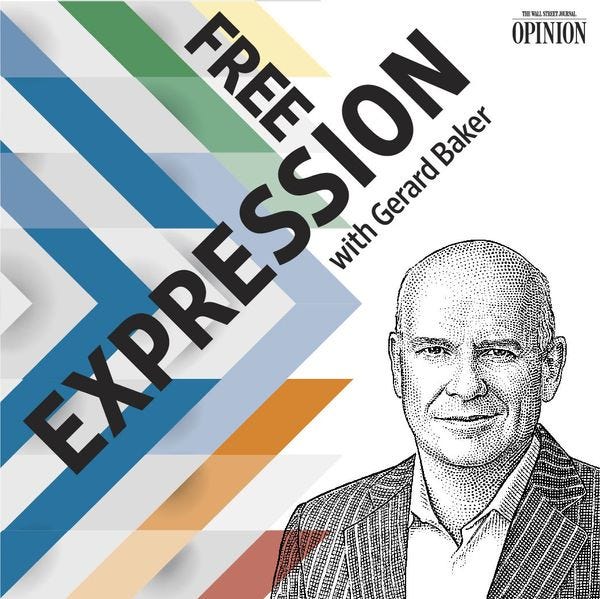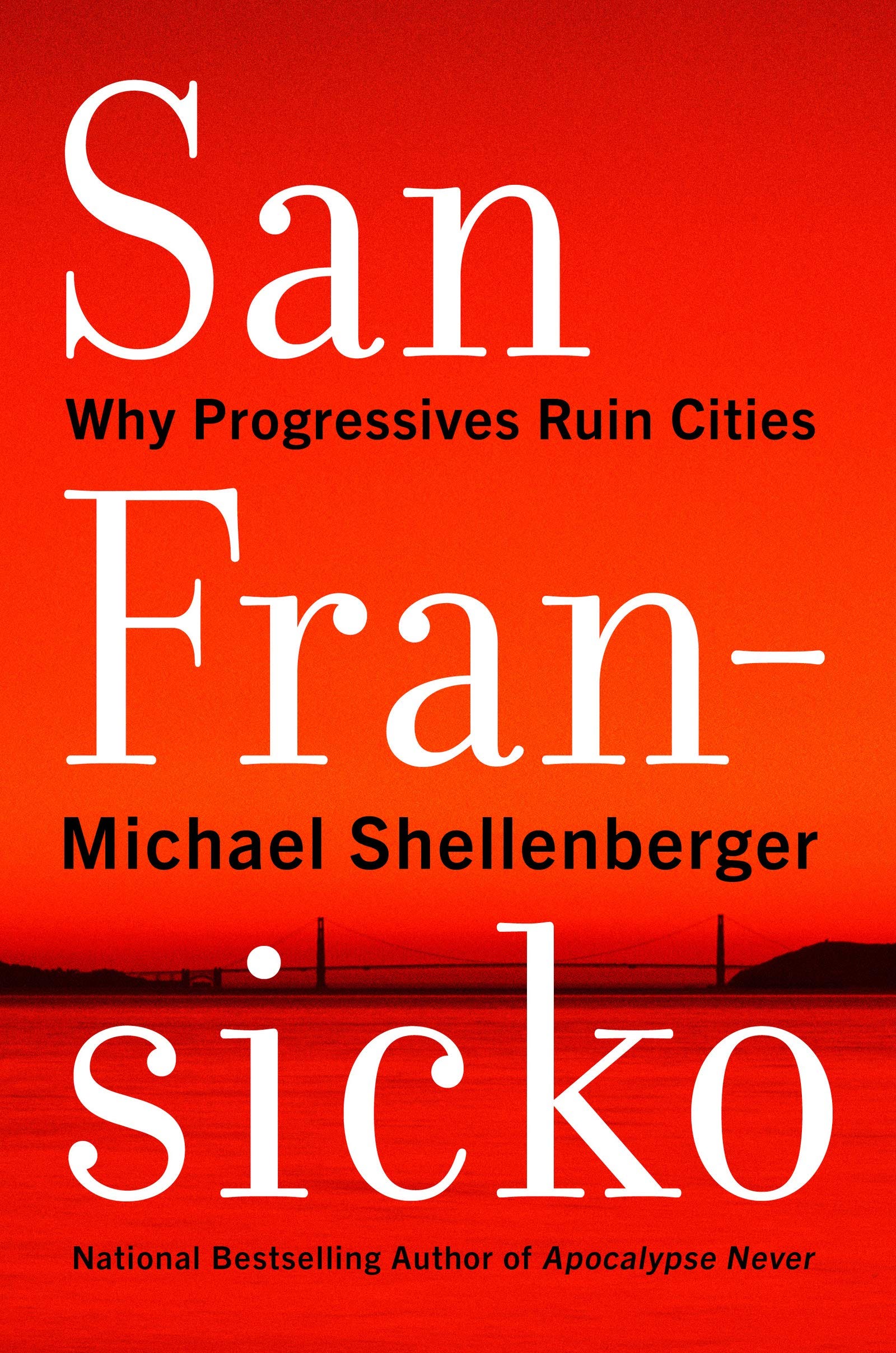Why We Create The Apocalypse We Fear
My conversation with the Wall Street Journal's Gerard Baker
By Michael Shellenberger
The Wall Street Journal
August 10, 2022
I spoke last week with Gerard Baker of The Wall Street Journal about why progressives undermine the civilization they claim to be saving. This is an edited version of the transcript of our conversation.
Crime, Drugs and HomelessnessBaker: The last two years have been traumatic for American cities. The lockdowns from COVID. The protests in the wake of George Floyd’s murder. Black Lives Matter. And a surge in crime. One response you get from the press is that it’s not as bad as all that. Actually, things are fine. But the title of your book, San Fransicko, perfectly captures the state of that particular city and other American cities. What are the policies that are leading to this damage? How bad is the problem? Shellenberger: I work on two issues, really: energy and the environment, on the one hand, and crime and homelessness, on the other. On the first, things are going much better than people realize. On drugs, crime, and homelessness, it’s all much worse than people realize. It's going to be very difficult to bring down crime, deal with the drug epidemic, and deal with the homelessness crisis. In fact, it's actually gotten worse in other cities outside of the Left Coast. What happened during the pandemic was, like so many other trends, an acceleration and intensification of preexisting trends. Those trends included de-policing certain areas and certain crimes, and reducing consequences for illegal and inappropriate behaviors. We call them “quality of life” crimes. Things like public defecation, urination, and petty theft don’t grab headlines but they erode the fabric of a city and not enforcing laws against them deprive mentally ill people and addicts the interventions they need to get into treatment and get the help they need. As for crime, starting with Black Lives Matter protests in 2015, we saw a demoralization of the police, and a pullback. They called it “the Ferguson effect” after the protest in Ferguson, Missouri, where the police pulled back from policing, including the investigation and deterrence of homicides. The result was an emboldenment of the criminal element. George Soros, the billionaire financier who has financed a lot of the efforts to de-police certain crimes wrote a defensive op-ed in The Wall Street Journal recently in which acknowledged that the withdrawal of police from policing was one of the factors behind higher crime, but he didn't acknowledge it is the withdrawal of police that emboldens criminal behavior. Around the country you've seen a breakdown of social order. San Francisco, Los Angeles, Seattle, Portland and other West Coast cities are the worst. But you've seen it in New York as well. There’s been a significant increase in people being pushed onto the subway tracks, a significant increase of “behavioral disorders,” as they get called, by people with addiction and mental illness. All of that is happening on top of the fact that we never really had a proper psychiatric care system. We had psychiatric hospitals that we shut down between the fifties and 1980s. And so it's a crisis point. Drug overdose deaths rose from 17,000 in the year 2000 to 108,000 last year. We're in a psychiatric crisis and haven't come to grips with what's going on. Baker: We've been very familiar with a lot of the opioid-related deaths, but in what sense is it a result of progressive policies? Shellenberger: The underlying cause is the loosening of strictness around law enforcement and social values. I see it as sort of a single phenomenon. Take the overprescription of opioids. Pharmaceutical companies certainly deserve a lot of the blame for that. So do medical doctors. But the ethos was that we were being too tough on people. I agree that we were under-treating pain and not properly treating psychiatric problems, but we were also justifying people becoming drug addicts. Some of that’s due to alienation, social isolation, and loneliness. But it’s also because people are bored and want to have a good time. People switched from pills to heroin and then to fentanyl and so by 2017 you had 70,000 people dying from drug overdoses. Then you had this acceleration of fentanyl. There's another drug that has been absolutely devastating that we don't talk about enough, probably, and that's methamphetamine. It has been increasing at an incremental basis from the 1950s, when it was being used as a street drug and as a prescription drug. Methamphetamine is contributing significantly to the behavioral disorders that we're seeing in the cities. So you see people in psychotic states, screaming at invisible enemies, engaging in physical attacks and harassment. When people are psychotic, we don't know if it's due to schizophrenia or from methamphetamine, but the increased amount of it has to be driven to a large extent by methamphetamine abuse, because schizophrenia is almost certainly a genetic disease, albeit one triggered by environmental factors. Baker: What is it that's driving this epidemic of mental health as you see it? Shellenberger: A big part of it is just going too soft on addiction and on homelessness. Most addicts don't need to go to prison but there need to be consequences for their behaviors. Certainly we should not be giving them money and normalizing the use of these really intoxicating and dangerous drugs. We know that you have to have consequences for behaviors otherwise you'll get more of those behaviors. It's now become very mainstream, this idea of harm reduction, which is the idea that nothing should be done to dissuade people from addiction or from the use of really dangerous drugs. It’s true that many people, arguably most people, can experiment with all kinds of drugs, and not form addictions. But a large percentage of people that do use opioids or methamphetamine end up forming some sort of “substance use disorder,” as we call it, and end up becoming addicts, no longer working, and lying, stealing, and cheating from family and friends to maintain their habits. Eventually they get kicked out of their friends and family's homes. That's the basic pattern of how people end up in tents in the street, feeding their addiction, begging for money, stealing, and turning to sex work. We’re dealing with a breakdown of civilization at a fundamental level because we're not enforcing consequences for those behaviors. The tendency has been to view the people that are suffering from addiction as victims, and to be sure many of them are victims, and many of them become victims because of their addiction. But that's not a reason not to have consequences for illegal or inappropriate public behaviors, including public camping and public defecation. The problem is the relaxation of social norms and laws. I trace it all the way back to the fifties in my research. We were just much stricter about these things in the past. Conservative cities are stricter than liberal ones. It doesn't have to be that way. If you go to Amsterdam or Lisbon or most cities in Europe, they just don't allow this kind of widespread homelessness among drug-addicted or mentally ill people that we allow. There's also a kind of libertarianism, too. If I had to kind of give it a single title, I guess I would call it left-libertarianism, but you might call it a kind of anarchism. It is justified as a kind of victim ideology, that everything should be given and nothing required of people classified as victims. But it’s an ideology proposed by people who are against Western civilization and who think our system of liberal democratic capitalism is wrong. They have been quite willing to put on display inappropriate behaviors in public because they see them as manifesting the overall inherently evil nature of Western civilization. Baker: Where do we at least start to turn back this tide? Shellenberger: I think there's big opportunities for new political actors. It starts with an affirmation of what we call civilization, which is based on institutions, including cities and policing. All neighborhoods have a right to public safety and cleanliness, including poor and working class neighborhoods. For Republicans and moderate Democrats ambitious to win over more poor, working class, and minority neighborhoods, it's a great issue for them. All of this requires an affirmation of the nation. The contrast between the West and the alternatives has not been more dramatic for at least 30 years, and maybe longer. Look at Russia's invasion of the Ukraine and China's mistreatment of the Uighur Muslims. It’s now more evident than ever that Western civilization is special. Moreover, this idea that we are all going to kind of unite into a single world system is pretty much gone now. Even progressive Democrats are seeking ways to isolate Russia and China. We just saw Nancy Pelosi fly to Taiwan. And I think there's a sense in which America is special. It is the anchor, the heavyweight, among Western nations. So I think that reaffirming the value of civilization and the specialness of the United States as the protector of civilization, of liberal democracy, is key. From that flows the idea that civilization requires rules, law and order, and institutions. If Republicans need to move in a particular direction it would be away from a knee-jerk affirmation of free markets above everything else. The nation has to come first. And that's going to require some sort of system of psychiatric and addiction care that we just have never really put in place in the United States. Most of Europe put it in place after World War II; we never did. So I think there's room here for new political actors, whether they're Democrats or Republicans to affirm a pro-civilization, pro-American agenda that has some affirmation of universal institutions and systems, including psychiatric care, but also things like policing and the value of cities. Gerard Baker: Michael Shellenberger, thank you very much indeed for joining us on Free Expression. Michael Shellenberger: Thanks so much for having me. |


1 comment:
Spot on.
Post a Comment